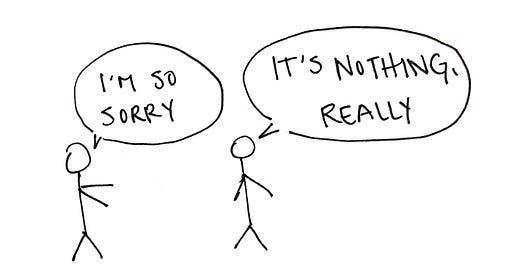“I don’t need your support.”
My friend Nathan’s dad was in a terrible accident.
He’s going to make it (hallelujah) but it scared the heck out of his family and will require months if not years of healing.
Nathan has handled the shock by springing into action:
He’s gotten his father the best care.
He’s supporting his mother as she works through her fear, anxiety, and worry.
He’s basically taking care of the entire family physically and emotionally.
When he told me the story, my heart understandably broke for him.
It was clear that Nathan was meeting this excruciating moment with incredible strength… while also likely nursing some shock and grief quietly on his own. And I wanted to let him know that he wasn’t alone, that he had my support and my consolation, that he could lean on me if need be.
Because grieving and healing isn’t something we are meant to do on our own.
“I’m so sorry, Nate! My heart goes out to you. This is so terrible!” I began.
He quickly jumped in, “Well, really it is my dad and mom who have it the worst…”
I cut in.
“Hey Nate, can we pause this conversation for a second?”
He nodded so I continued. (Nate and I know each other well so he trusts my well-intentioned but abrupt transitions!)
“First of all, you are suffering too. This is your father. This is scary.”
He looked down at his hands; an expression of sorrow flashed across his face then disappeared as just quickly.
I reached my hands out to him across the table.
“Second, I don’t know your dad, but I know you. So you are the person I am trying to comfort, trying to give my energy to, trying to fortify with my caring and concern.
“When you cannot accept my consolation, you are saying my love for you is not necessary. But I know it is.”
Nathan sighed and let his shoulders relax… Like they had put down part, not all, but part of their load.
Like he didn’t have to carry it all on his own.
Nathan knows the story of my husband’s death. So he knew this wasn't just lip service.
“I know from experience (ahem) that my energy, my prayers, my concern will make a tangible impact on you.
“Please don’t deflect it. Please receive it, absorb it, let it strengthen you. Accept the unexplainable — that it will make a difference.”
Nathan paused, and finally slowly smiled.

The strange math of giving & receiving.
I saw Nathan a few weeks later.
His dad is slowly healing (hallelujah x2!) but there is still a lot of family-wide stress as the recovery process plays out, as well as uncertainty about what their collective future will look like.
(Dealing with not knowing is a huge deal we will look at in a future post because, spoiler alert, almost all of life is not knowing.)
But in the short-term, Nathan has flexed his receiving muscles to his whole family’s benefit. He isn’t trying to do it all on his own. He is not only accepting support, he is asking for it!
As a result, Nathan gets to sleep, spend quality time with his wife and mom, and actually go outside (running from building to car to building does not count).
Simultaneously, Nathan’s other family members get to feel helpful, impactful, powerful… Rather than lost in grief and uncertainty without being able to do a single thing about it.
Because receiving and giving, on an energetic level, are the same thing.
When we receive, we also give something to the giver — the intangible but irreplaceable feeling of making a difference. Of not just being a helpless bystander. Of contributing to life-changing, even life-saving work.
1 + 1 = 11.
Everyone leaves with more than they had before.
Everyone feels more connected than they did before.
Everyone is fulfilling their own needs more than they were before (example: the burnt-out get to sleep and the antsy get to help.)
This is the new math we have to use when doing human calculations. Here, addition doesn’t exist.
It’s replaced by exponential expansion of caring, of connection… of love.
In Nathan’s case, now the whole family is working together to cover shifts at the rehab center with his dad, cook meals for his mom, and just generally “show up” — whether that’s with a check-in call, an emotional-support bag of Flaming Spice Doritos, or a Costco-sized crate of Puff’s Extra Soft Tissues.
They have never felt more like a family.
They have never felt so connected to each other, so in-tune with each other’s needs, so cared for themselves.
Our collective false beliefs about the downsides of receiving.
So why don’t you like to receive?
Are you judging your suffering to be so minor compared to the person “really” suffering — Nathan vs. his dad — that accepting support feels wrong?
Do you falsely believe there is a hierarchy to suffering, some giant invisible pyramid where only those at the tippy top deserve support?
Have you trained your brain to not go to dark places, fearing your emotions will spill over? So when someone offers you support, it feels like a crowbar trying to pry open the tightly-sealed chamber where you’ve stuffed all your roiling emotions… and you want nothing to do with it?
Or are you worried that receiving help will make you weak? That you’ll forget how to stand on your own two feet, that you’ll melt into a pile of mush and never find your way back to being a powerful, independent, productive human being ever again?
None of these reasons are inherently bad.
They just are not helping you in the way you think.
In conclusion.
Nathan shared one more vignette of giving and receiving that has stayed in my mind for weeks.
On a visit to the hospital, he was surprised to come in and see his mom feeding his dad. Nathan’s dad was capable of feeding himself — his injuries did not prevent him from doing so — and yet his mom was spooning small, careful bites into his mouth.
Nathan realized that this was his dad’s way of offering her solace. Giving his wife a tangible, action-oriented way of sharing her love, of helping him… and in the process lessening her suffering.
Nathan didn’t offer what his dad was feeling in that moment… But we can put ourselves in his hospital bed and know how we’d feel. Loved and cared for of course. But also maybe galvanized.
Maybe even more devoted to our healing.
Maybe re-dedicating ourselves to full recovery because — no matter how hard it will be — it will be worth it.
When we allow ourselves to receive, we are not just supported in tangible ways, we are also ignited in emotional ways.
We realize our healing, surviving, thriving is bigger than us. It’s for the ones we love.
So we overcome our hardships — again and again, big and small, in a thousand ways throughout our lives — to return the favor of love. To give back into this magic web of human connection and support and vulnerability that we are lucky enough to live within. Giving and receiving, over and over and over again.
Thank you, Nate, for sharing this incredible example with us all.

Dear reader, in the next week, how will you feed others? How will you let yourself be fed?
Challenge yourself to not return a single gift of support, of solace, even a compliment unopened.
Let the nodes of network and communal support begin to form, enriching our world with symbiotic love and care… starting around you.
In connection,
Sue








Realizing that receiving helps the giver actually fulfill their needs is huge for me. Thanks so much Sue!
Love this! It's surprising to remember that it's so much easier to give help than to receive it...